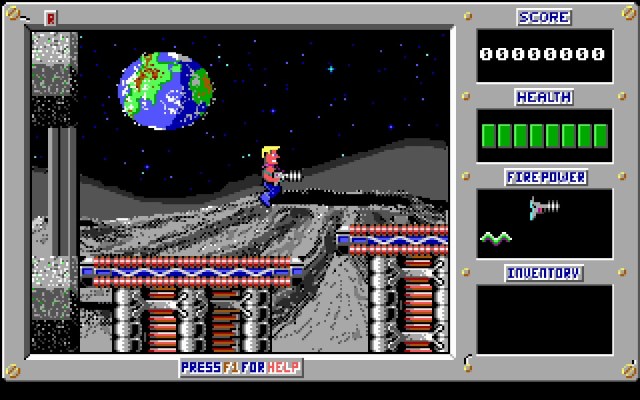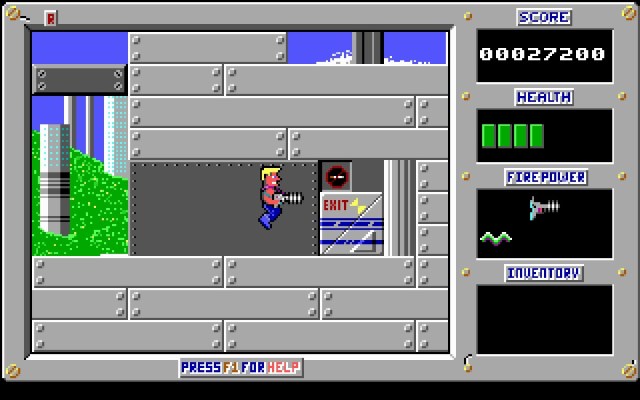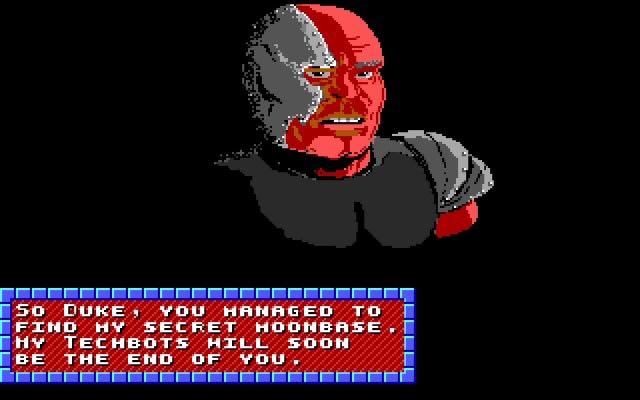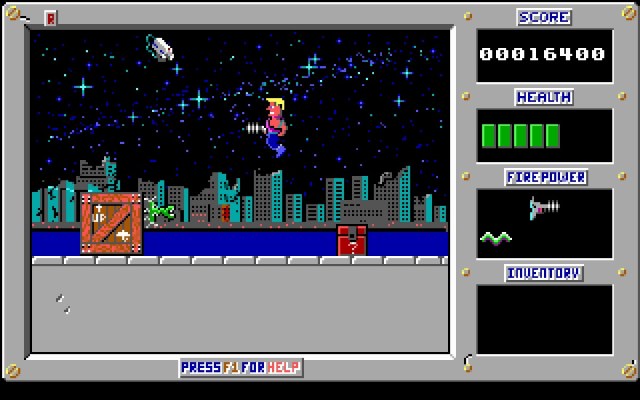The Nukem Paradox
I simultaneously subscribe to two opposing beliefs about Duke Nukem. The first is that, anecdotally, many people don’t recall or even realize that there were two games starring the character before Duke Nukem 3D. The second is that everyone who owned a capable PC in the early 90s played Duke’s first adventures. In either case, Duke Nukem 3D greatly overshadowed the games that came before it.
Apogee’s shareware distribution model meant that the first episode of many of their games were completely free. This put games like Duke Nukem on a lot of hard drives, even before the internet was really widespread. People selling Intel-based PC-compatibles could load the systems up with these games, then advertise them as additional features. Buying a computer for work? Well, the kids might dig these games. You should definitely spring for the 486 model.
It’s this practice that made me a fan of Duke Nukem even before he was spitting wisecracks. My Aunt owned an IBM PC, and she had the shareware version of Duke Nukem. When my family finally got a computer, it had the first episode on it. By the time the character started doing his best Ash Williams impression, I was already indoctrinated.

Hail to the compatibility
Duke Nukem first hit computers in 1991. The Sega Genesis had already been on the scene for two years, and the SNES came out that same year, but this is what games on DOS looked like. It’s easy to see PCs as a bastion for cutting-edge tech nowadays, but at the time, compatibility was king, which typically meant supporting the 8088 processor. Commander Keen: Invasion of the Vorticons came out in 1990 and was fancy enough that you needed a 286 at the minimum, but I’m getting carried away here.
What I’m saying is that, yes, Duke Nukem is kind of ugly compared to contemporaries on other platforms. That was normal.
It also didn’t scroll especially well. One of the things that early 8-bit consoles did really well was their scrolling, but that was the benefit of having the hardware designed around it. Duke’s movements and the levels themselves are very choppy. This never really bothered me. It does four-direction scrolling pretty well, and because the whole game is choppy, it doesn’t really take long to grow accustomed to it. It’s just one of the quirks of the era.

Oprah of the Future
Anyhoo, Duke Nukem is the timeless story of Dr. Proton, a bad guy that attacks L.A. for some reason. He’s using fancy techbots to cause destruction, and only Duke is a bad enough dude to stop him. Also, Duke wants to end this quickly so he can get back home to watch Oprah. The stakes are high!
Given the time period, you’d kind of expect that Duke Nukem would just be Apogee’s in-house take on Commander Keen, and it’s really not. It actually has more in common with Duke Nukem 3D. You drop in a level, and you need to scour it to find keys, unlock doors, and get to the exit. It’s not at all that different from what would become the maiden formula for first-person shooters.
It works. As someone who has always been in orbit around Duke Nukem, I may not be the best judge of this, but the formula stands up well. It’s possible that a game about a dude jumping on platforms and shooting robots with his ray gun may come across as really generic, but I think it still stacks up. It’s maybe not Commander Keen, but it compares all the same.

Time to Squeeze
This could be attributed to its excellent sense of progression in each of the episodes. As an episode continues, you gain power-ups that you’ll keep throughout its duration. Things like weapon upgrades (that increase the number of projectiles you can have on-screen at a time), grappling claws that let you stick to certain ceilings, or even a hand that lets you touch a thing. Each episode is often less than two hours long, meaning the whole set of three will run you maybe 4-6 hours.
Apogee squeezed a decent amount of variety out of Duke Nukem’s mechanics. There’s a certain rigidity to it, as Duke doesn’t have much more to his repertoire than jumping and shooting. However, the key-hunt formula allows for some creative design with the maze-like levels. The three episodes explore everything this engine can do, so by the time you hit the third episode, there isn’t much left to surprise.
It at least does well with themes. The first episode is Shrapnel City, taking place in and below L.A. Next, you’re on the moon, and finally, you travel to the future. The locales don’t have much bearing on the gameplay itself, but there’s enough change in backdrops and some creative level designs to at least make each one distinct.

Insatiable taste for babes
Most notably, this is before Duke really got his attitude. He doesn’t wear sunglasses, for example, and he’s a bit more cartoony than some of the more serious action heroes at the time. I don’t think, at this stage, someone was really thinking hard about what kind of character he would be. He’s sort of like discount bin Arnold Schwarzenegger, and that was enough to carry the game.
1993’s Duke Nukem 2 was when he started to get his edge. Certain standards established in this first title stay true throughout the series, you just shouldn’t expect to see tits here. In fact, Duke’s insatiable taste for “babes” doesn’t really factor in yet. He’s just the only competent person on Earth, and it’s up to him to stop Dr. Proton.
Because of that, playing Duke Nukem is perhaps more useful in seeing how the series evolved into one of the biggest first-person shooters of all time. On the other hand, if you just want to see Duke as he is now, it’s completely missable.
I do want to point out that because Duke shares his name with a Captain Planet character for some reason, Apogee later released a version where he was named “Duke Nukum.” That’s not canon, nor was it how it was originally. Someone was definitely going to mention that little piece of trivia, so I wanted to get the jump on it.
Unfortunately, Duke’s current rights holder, Gearbox, hasn’t made playing the original episodes of Duke Nukem easy. They’re available on the Zoom Platform due to a pre-existing agreement. A “remastered” version is also coming to Evercade this Fall that touches things up and smooths out the scrolling. That’s currently the only slated platform for the remasters, which I respect. Especially since it might be the killer app needed to get me to buy an Evercade, but I still hope it comes to other platforms. More people need to see a future where Oprah is still on broadcast TV.
For other retro titles you may have missed, click right here!


